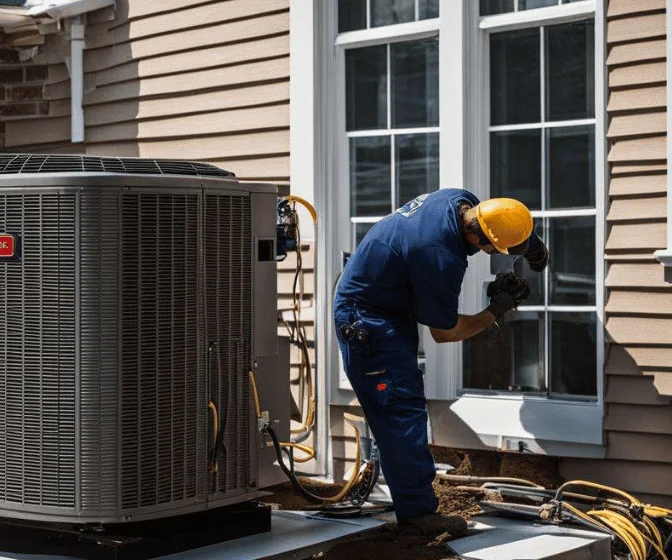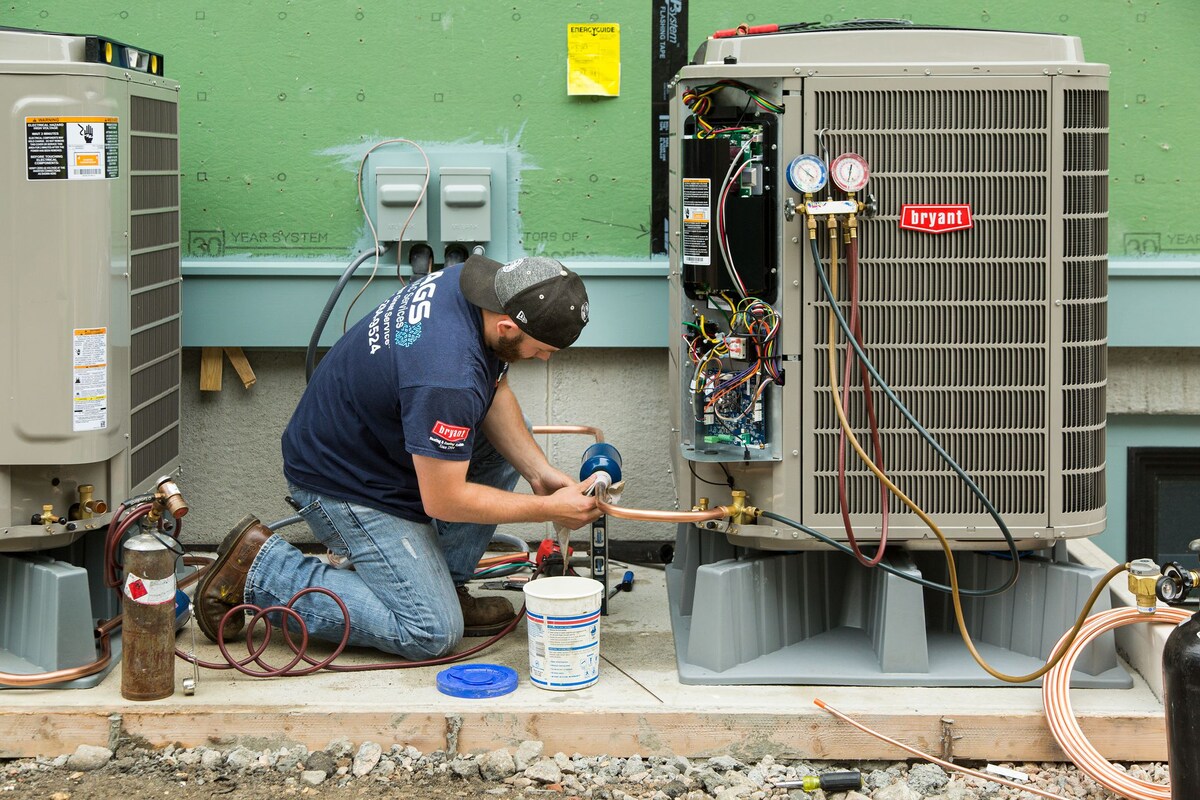Cost To Install Central Air Conditioning

Understanding the Cost of Central Air Conditioning Installation
Installing central air conditioning is a significant investment in your home's comfort and value. But navigating the costs can be tricky. This guide breaks down the factors influencing the final price tag, helping you make informed decisions and budget effectively.
Factors Influencing Installation Costs
Several elements contribute to the total cost of installing a central AC system. Understanding these factors is crucial for accurate budgeting.
- System Size (BTU): The size of your AC unit, measured in British Thermal Units (BTU), directly impacts the price. Larger homes require more powerful units, increasing both equipment and installation costs. A professional HVAC technician can perform a Manual J load calculation to determine the precise BTU requirement for your home.
- SEER Rating: The Seasonal Energy Efficiency Ratio (SEER) measures the cooling efficiency of an AC unit. Higher SEER ratings mean greater energy savings over time, but also a higher upfront cost. Units with higher SEER ratings will be more expensive, but will save you money each month.
- Type of System: Central AC systems come in various types, including split systems, packaged units, and ductless mini-splits (although these are not technically "central" air). Split systems, with an outdoor condenser and indoor air handler, are the most common. Packaged units combine all components in a single outdoor unit. The complexity of installation varies with each type.
- Ductwork: If your home already has ductwork in good condition, the installation cost will be lower. However, if ductwork needs to be installed, repaired, or replaced, this can significantly increase the overall cost. Older homes often require more extensive ductwork modifications.
- Labor Costs: Labor rates vary depending on your location and the contractor you choose. Getting multiple quotes is essential to ensure you're getting a fair price. Experienced, licensed contractors will typically charge more, but their expertise can prevent costly mistakes.
- Brand and Model: Different brands and models offer varying features and performance levels, influencing the price. Premium brands like Carrier and Trane often come with higher price tags but may offer better reliability and efficiency.
- Permits and Inspections: Local building codes often require permits and inspections for HVAC installations. These fees add to the overall cost but ensure the installation meets safety standards.
- Electrical Upgrades: In some cases, your home's electrical system may need to be upgraded to handle the power demands of the new AC unit. This can involve adding a new circuit breaker or upgrading the electrical panel.
Average Cost Breakdown
While the exact cost varies, here's a general breakdown of what you can expect to pay:
- Basic Installation (replacing an existing unit): $3,000 - $7,000
- New Installation (including ductwork): $7,000 - $15,000+
- High-Efficiency Systems (high SEER rating): $5,000 - $10,000+ (equipment only)
These figures are estimates, and it's crucial to get personalized quotes from local HVAC contractors.
Popular Brands and Models: A Comparison
Choosing the right brand and model is crucial for long-term performance and reliability. Here's a comparison of some popular options:
Carrier
Carrier is a well-respected brand known for its innovative technology and energy-efficient systems. Their Infinity series offers advanced features like zoning and smart controls.
Pros: High efficiency, advanced features, durable construction.
Cons: Higher upfront cost.
Notable Models: Infinity 26, Comfort 16
Trane
Trane is renowned for its reliability and durability. Their units are built to withstand harsh conditions and provide consistent performance.
Pros: Excellent reliability, robust construction, good warranty coverage.
Cons: Can be noisier than some other brands.
Notable Models: XR16, XV20i
Goodman
Goodman offers a more budget-friendly option without sacrificing essential performance. They provide a good balance of cost and features.
Pros: Affordable, decent efficiency, readily available parts.
Cons: May not be as durable as higher-end brands.
Notable Models: GSX16, GSX14
Lennox
Lennox provides high-efficiency units. Lennox’s more advanced systems are designed to offer better comfort and energy savings.
Pros: Quiet Operation, Energy efficient and Smart features
Cons: Higher initial investment
Notable Models: SL28XCV, ML17XC1
Understanding SEER, AFUE, and HSPF Ratings
These ratings are crucial for comparing the efficiency of different HVAC systems:
- SEER (Seasonal Energy Efficiency Ratio): Measures cooling efficiency. Higher SEER = lower energy bills. Look for units with a SEER rating of at least 14, with 16 or higher being preferable.
- AFUE (Annual Fuel Utilization Efficiency): This rating applies to furnaces and measures heating efficiency. Since we are discussing AC, this is less relevant, but it's important to consider if you're replacing your entire HVAC system. Higher AFUE = lower heating costs.
- HSPF (Heating Seasonal Performance Factor): This rating applies to heat pumps and measures heating efficiency. Again, relevant if considering a heat pump system. Higher HSPF = lower heating costs.
Important Note: Minimum SEER ratings have increased in recent years. Be sure to check the current regional requirements for your area.
Warranties and Maintenance
A solid warranty provides peace of mind and protects your investment. Look for systems with at least a 10-year warranty on parts. Some manufacturers also offer extended warranties covering labor costs.
Regular maintenance is crucial for maximizing the lifespan and efficiency of your AC system. Schedule annual professional maintenance to clean coils, check refrigerant levels, and inspect components. Also, remember to regularly change your air filters.
DIY vs. Professional Installation
While some homeowners may be tempted to install a central AC system themselves, it's generally not recommended. Professional installation ensures proper sizing, refrigerant charging, and adherence to local codes. Improper installation can void warranties and lead to performance problems.
Financing Options and Rebates
Many HVAC contractors offer financing options to help spread out the cost of a new AC system. You may also be eligible for rebates from your utility company or government programs for installing energy-efficient equipment. Research available options to reduce the upfront cost.
Getting Multiple Quotes
Always get at least three quotes from different HVAC contractors before making a decision. This allows you to compare pricing, experience, and warranty offerings. Be sure to ask for detailed breakdowns of the proposed work and equipment specifications.
Questions to Ask Your HVAC Contractor
- Are you licensed and insured?
- Do you offer a warranty on your work?
- What size AC unit do you recommend for my home, and how did you determine this?
- What is the SEER rating of the unit you are proposing?
- What is the estimated installation time?
- Will you handle all necessary permits and inspections?
- Do you offer financing options?
- Can you provide references from previous customers?
Making the Right Choice
Investing in a new central AC system is a significant decision. By understanding the factors influencing installation costs, comparing brands and models, and working with a reputable HVAC contractor, you can ensure a comfortable and efficient home for years to come. Don't hesitate to ask questions and do your research to find the best solution for your needs and budget.
Consider your budget, long-term energy savings goals, and the specific needs of your home when making your final decision. A well-chosen and properly installed central AC system can significantly improve your quality of life and increase the value of your property. Remember to look for Energy Star certified appliances.










